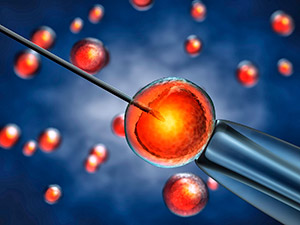In Vitro Fertilization - ICSI/Super ICSI

IVF is the most sophisticated Assisted Reproduction technique. In this treatment the patient is given certain fertility drugs to recruit a larger number of eggs (normally only 1 per month is produced). The eggs (oocytes) grow in small liquid-filled cysts called FOLLICLES.
The patient is sedated and the eggs are aspirated through the vagina by means of a special needle, then fertilized with sperm in a laboratory by a specialized professional (an embryologist). The embryos thus develop for some days in a culture medium and are returned to the uterus from 2 to 5 days after egg collection; at this moment implantation may or may not occur (i.e. fixation in the endometrium).
INDICATIONS:
- Women with peritoneal changes (excessive number of adherences)
- Blocked fallopian tubes or tubal ligation
- Sterility without apparent cause (S.W.A.C.)
- Immune factors
- Endometriosis
- A severe male factor or vasectomy
- Woman's age
There are several protocols for inducing ovulation, and a decision as to which one to use depends on certain variables, such as: Age, how long the couple has been trying, previous treatments, the cause of infertility, etc...
The rate of success is directly linked to the woman's age, how long the couple has been fertile, and the cause thereof.
On average:
| Woman's age | <30 | 30 to 35 | 35 to 37 | 37 to 40 | >40 |
| Rate of pregnancy per attempt | 55 to 60% | 45 to 50% | 35 to 40% | 20 to 30% | 5 to 15% |
